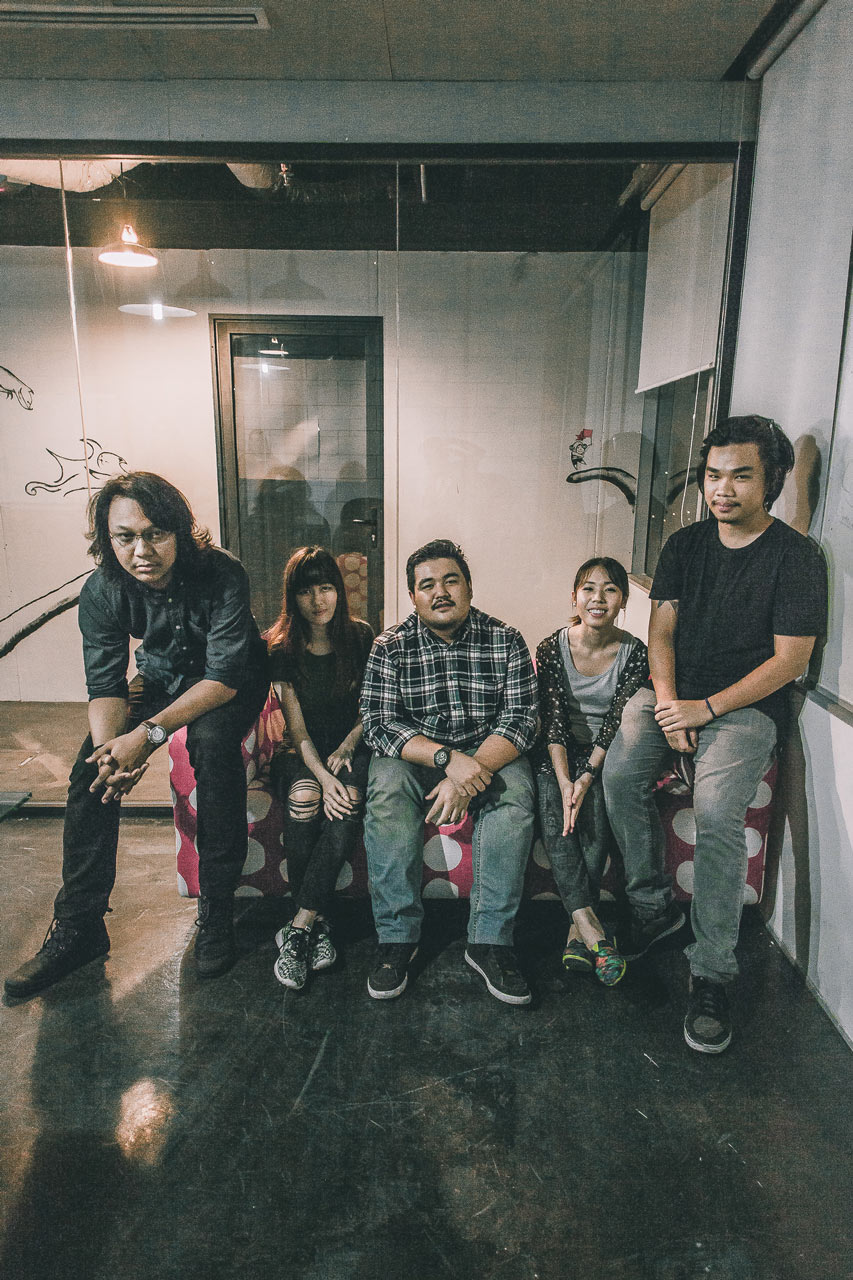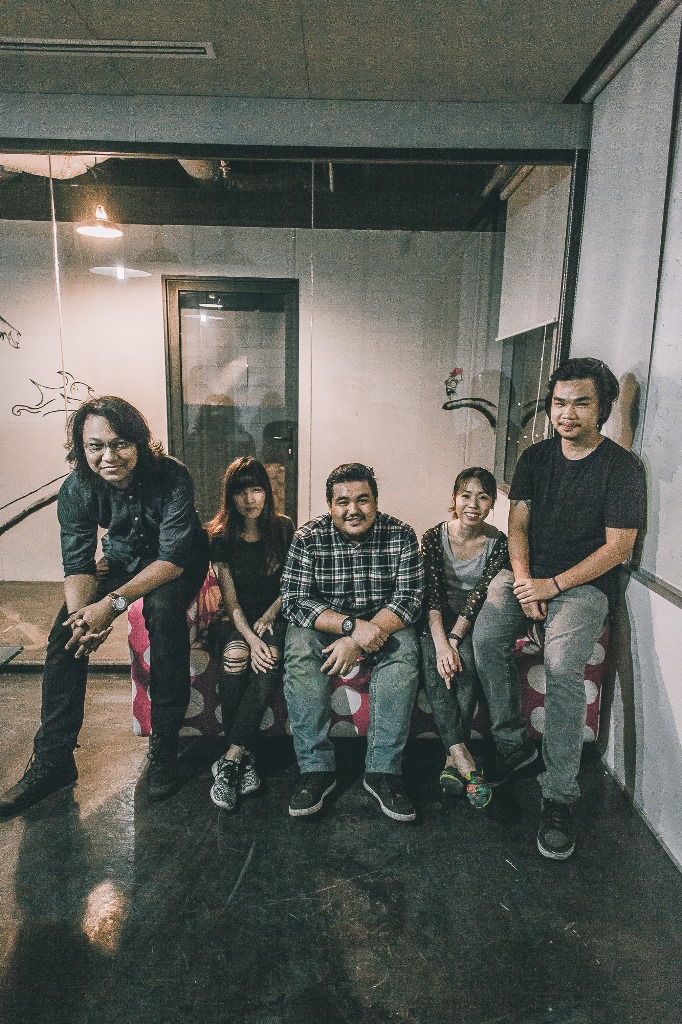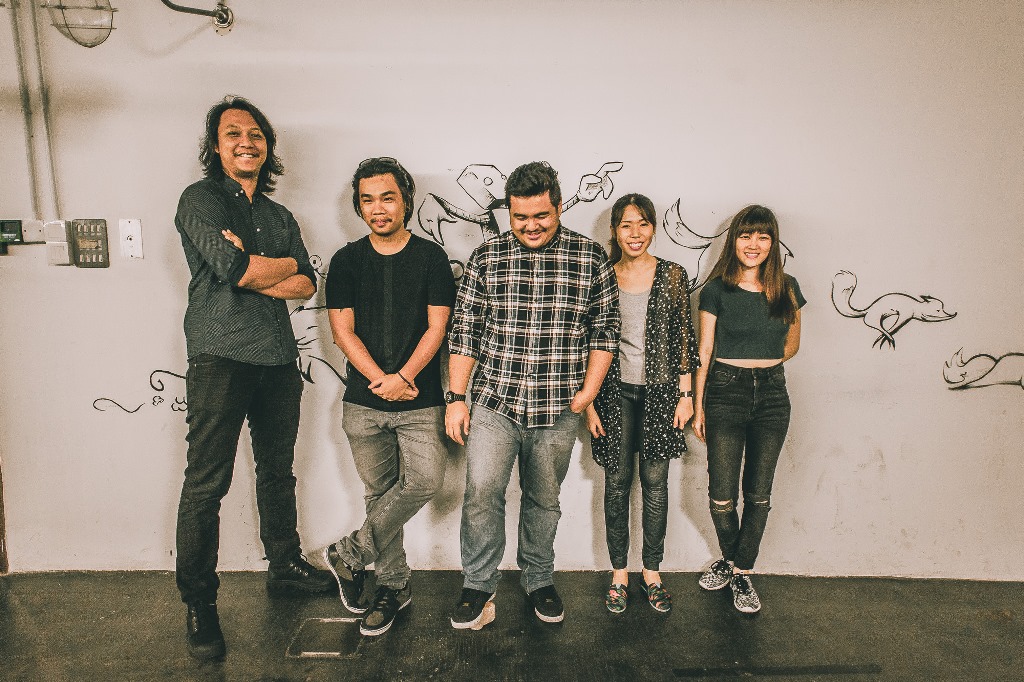mutesite: From Outcasts to Finding Each Other
 Thirsty for JUICE content? Quench your cravings on our Instagram, TikTok and WhatsApp
Thirsty for JUICE content? Quench your cravings on our Instagram, TikTok and WhatsApp

Instrumental band mutesite is just a year old. But to arrive at this stage of mutual respect and friendship, it took a while for each member to play in various bands and experiment with different sounds before eventually settling into this current formation of a five-piece band. Though the lineup has stabilised, the band is still finding their sound, even meeting the description of their music as ‘math rock’ or ‘post-rock’ with a tinge of uncertainty. Even so, their debut EP re:start received enough local and international recognition that it was even pirated! JUICE spoke to the quintet about their year long Whiplash-esque recording of their EP, the narrative structures of their songs, and how the girls deal with catcalls at gigs.
You guys described yourselves as “outcasted [sic] musicians” in the band’s bio. Why did you guys feel like you didn’t belong in your respective bands?
Anthony These two (Karim and Purnama) used to play for The Impatient Sisters.
Jolynn He (Anthony) used to play for Once Upon A Time There Was A Sausage Named Bob.
Karim She used to play for Flying Pan.
A Nobody knows that!
J … the point is that we felt like we didn’t belong.
K I can speak for the band; we are people who want to improve more musically. When we started out in these bands, it was fun; we poured our hearts into it. But after a while, we sort of grew out of that shell. It’s not that we don’t like the music, it’s like when you’re eating rice every day, why do you have to only eat white rice? There are so many choices. So our situation was that we were growing forward, and the bands [we were in] weren’t where we were at, so we felt a bit like outcasts. So we went our separate ways, but it’s all good, we’re still friends. We still keep in touch.
A There are no hard feelings. We can go all night about this. It’s about relationships, it’s about jobs, it’s about life in general.
K I mean, The Impatient Sisters; who knew they were going to be mega famous. When we (Purnama and Karim) started out [with them], it was just these three sisters who asked us to help out. We did all the percussion and drums for their album. So we had our fun till we grew out of it and they continued on with their own thing. We tried to do more stuff, so we wouldn’t get bored.
How did the transition from Jolynn’s singer-songwriter material to becoming an instrumental band occur?
J It was more like when we jammed and wrote the songs, we just went from A to B to C to D. There wasn’t any decision made actually, it just turned out that way. We didn’t say we wanted or didn’t want vocals; it was just, “Hey, this sounds nice! We can go with this!” It was spontaneous and everyone agreed.
A We’re not trying to follow the trend. I know there’s this trend (chuckles) of instrumental bands coming out.
K We’re just trying to do something that sounds right to us. In the near future, there might be vocals. We’re not going to limit ourselves with no vocals all the way. For now, we’re a post-rock band.
A I don’t think we’re a post-rock band actually. I don’t know how to term us, but as long as you like our stuff…
K Like I’ll use Snarky Puppy as an example. They are all jazzers, but they don’t all personally play jazz. The band itself plays funk, rock, soul, trip hop. And now they’re playing the Family Dinner sessions where they have a vocalist now. They are straying away from what they did, but you can hear the essence of the band. You can hear the quality of each band member. Personally, that’s what I want.
A I think that’s what we all want.
J We’re not trying to define ourselves with [a particular genre]. We’re open to experimentation, whichever works, works.
You guys also spoke about working with a producer called Anthony at Big A Productions who was very strict. Can you guys talk a bit about that experience?
All (Giggles and nervously laughs).
A I think whomever has watched Whiplash…
Oh wow. He was like J.K. Simmons’ character?
A Well, he was not that bad.
But if he were anywhere close to that sort of personality, it would be quite crazy.
J (Laughs) He’s not that bad.
K We all had the pressure – it was good – but like any pressure, we had to face it. But again, I’m not a drummer, I’m a percussionist. That’s my forte. So when I started playing drums, it was just… damn, like I had to practise one week straight to get things right and make up parts. So during recording, I thought, “Okay, this is going to be fun.” I didn’t know we were going to get a drill sergeant like, “That’s wrong, man! You’re not on time!”
So, it is exactly like Whiplash!
K Yeah, but he doesn’t yell at you. He just tells you, he pushes the best out of you.
A The vibe was like, for example, you think you’re done, and he just goes to you and go, “So how?” I’d think I did alright, and he’d be like, “No, do it again.”
J We went to him because he’s my boss. I knew that he’d push us to do our best. So, it’s good for us.
K And he did put his whole heart into our band. He was opinionated. Our songwriting is more structured now.
Was there a certain emotion that you guys wanted to capture for the EP? Because personally, your songs are much more emotional as compared with some of the instrumental rock songs out there that are more aggressive and muscular.
J Our goal is to tell stories. So when you’re listening to the songs, there are ups and downs. You can imagine a scenario, like ‘afterain’, it starts out with a gloomy day, and then sunshine, kids coming out to play.
A But the stories are entirely up to you.
J Yeah. Every one of us has different stories as long as it portrays an essence of a plot.
A I would say that there are mixed emotions. Like when we play our live sets, we always switch our songs around. We try to study our audience as well. Like, this crowd won’t be very impressed if we started with a slow song, so we better get them with a fast song.
J There’s always hidden meanings in our songs. Like if it’s dark, it’s not completely dark, there’s still a tinge of hope. When it’s happy, it’s not just happy, there’s a tinge of memory in it.
Yeah, it’s much more nuanced.
J Yes, exactly. I couldn’t find the word to describe it.

Do you guys have any cinematic tendencies? We’re asking this because a lot of the songs on the EP sound very filmic, like the end of ‘e.d.g.e’, it sounds like a movie – it’s bright and hopeful. And ‘afterain’, it quite obviously sets a scene in your mind because of the rain sample.
A Yeah, yeah. But in a way, we didn’t compose the songs that way. You have no idea how many times during production where I went, “We should do more with this part.”
K I don’t think it was us, it was Anthony Botak from Big A Productions. When we started out, we really didn’t know what to do. We had an idea… well, we thought we had an idea. When we got to Anthony, he was like, “No, you don’t.” So, he broke us apart, and we built us back up. In that one year, there was a lot of perbincangan.
A A lot of ding dong, man.
K Now even playing as a five-piece with me as a percussionist – how many percussionists are there in post-rock or math rock bands now? So, it’s that kind of old-new thing as well. I’m putting my own interpretation of colours, or as you said, cinematic tendencies, into it.
Oh, you see colours when you play music? We think the condition is called synaesthesia.
A Yeah, we all see colour.
Purnama It’s a condition?! (Feigns a horrified moan)
Yeah, a lot of musicians have it apparently. What sort of colour or scene would you say describes the EP?
A I think it’s monochrome. Kinda like really, really sepia.
J I can’t… (To Jie Er) No, the girls can’t see in colours (laughs).
K To me, ‘picking paces’ is sort of like a [British] train. It’s a grey morning, there’s dew everywhere. ‘afterain’ is a sort of orange (laughs). But we never consciously write it that way.
P Mine is very warm, but white-ish. Like a chilly warmth.
J ‘trails in motion’ is about a journey on train and ‘picking paces’ is about a journey on foot.
Jie Er I don’t really imagine a colour or scene when I play. I just feel the music.
When you guys were telling us the story of how the band came to be, we don’t think we heard Jie Er in the story. So can you tell us how you became part of the band?
JE I saw them at Laundry and I was a big fan of them.
J That time, Yvonne didn’t want to play in the band anymore.
A Yeah, and I panicked.
JE So Jolynn messaged me, “So what do you think of our band?” I thought she just wanted my comment, so I said, “Yeah, very nice! I like it very much!” And then she asked me to join the band. At the time, I was having a bad day, very emo. When she asked me, I was very happy and I said yes straight away.
A When Jie Er joined, all these five songs were already written. Karim came in to finish the fifth song. The rest of the songs were by me, Jolynn, Yvonne, and Jared (former bandmates).
You guys made a comment in an interview with The Wknd that making instrumental music is not very popular in a way and it isn’t what the audience wants. But don’t you think with Dirgahayu, they’ve opened the door for bands like you guys?
A I think the scene has grown, but I also have to give props to Dirgahayu too.
J They made instrumental music mainstream.
All Yeah.
K They market themselves very well. It has inspired us all to do the same. They waited for no one. It was sort of like, “If no one wants to listen to us, we will make you listen to our music.” Music-wise, they are older than us. We’re best friends; we hang out all the time.
J I would say that they made instrumental music cool. [Though] we’re not trying to do what they’re doing, we respect them for raising the bar.
K They’ve made themselves a brand.
A And I think we’ve played the most shows with them. Yeah, we certainly look up to them. We like what they’re doing, but we’re definitely not going to copy what they do, but yeah, we would definitely do a concept album.
J The benchmark is that high… But most importantly, we want our music to be heard.
When we saw you guys at Playspace, we were standing in front of this dude. Anthony was introducing each of you, and when it came to the girls; this particular dude was catcalling so loudly. We were disgusted on your behalf. How do you girls feel when you’re in this situation? Because we’re sure you just want to play and not be disrespected that way.
The guys This is heavy stuff here.
JE Actually for me, I feel it’s ok-lah. I don’t feel anything.
Oh, is it because you’re used to it?
A I think it’s because [she’s] used to it.
J Yeah, because it happens all the time.
A You know what’s the worst part? When the organisers [promote a show in the event page], they’d say, “Please come early. Kalau tak, you tak dapat tengok amoi main bass.”
K But as a band, we don’t let any smack talk go to her. We take care of each other. It just happens when she’s on stage, when we’re off-stage, no one actually approaches her.
It’s a cowardly move-lah, that’s why they’re catcalling.
A Yeah! It’s a cowardly move.
JE But I try to not look at them in the eyes when I come down from the stage. But they do like to take photographs.
A Oh yeah, a lot of people like to take photos with her.
J Yeah, especially with her.
JE They are okay, they don’t get touchy.
K But if they were to touch her, there’s a six-footer here (referring to Purnama), and a guy who can bulldoze…
A And some Chinese dude who’s very loud (laughs).
JE But I also want to show that girls can play instruments too. They are shocked when they find out it’s a girl playing the bass, but they don’t talk about my playing – the groove, style, technique, or anything.
P But a lot of my friends said that her grooves are great, tone pun sedap.
J For me, I don’t really think much about it because we’re just there to play music. If it’s a girl [playing], so what? If people want to see two girls in a band, it’s a good thing for the band – it’s marketing. In the end, people will come to watch us. Being a girl or a guy, it doesn’t make a difference.
A But we’re not the attractive ones…
J … It really doesn’t matter.
True. But we’re not highlighting your gender here; we just wanted to know how you felt about being disrespected that way.
J I don’t feel it was disrespectful too, because they didn’t do anything. But maybe they were just surprised, like, “Hey, there are girls!” But to me, [being a female musician] is nothing special. Our former bassist was a girl, and people asked me where do I find all these female musicians (laughs). We don’t purposely choose girls, it was just that I played with Jie Er once, and she said yes when I asked her to join the band.
mutesite’s debut EP re:start is available for streaming and purchase via mutesite.bandcamp.com. Purchase a physical copy by emailing [email protected] or at Big A Productions; Jammer Music, Kuantan; Live Fact; and at Chronic Crony Collective events.


 Get Audio+
Get Audio+ Hot FM
Hot FM Kool 101
Kool 101 Eight FM
Eight FM Fly FM
Fly FM Molek FM
Molek FM